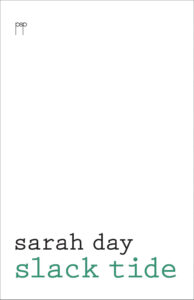 Reviewed by Beatriz Copello
Reviewed by Beatriz Copello
Slack Tide
by Sarah Day
Pitt Street Poetry
Paperback, 122 pages, ISBN 978-1-922080-04-2, A$28.00
Slack Tide by Sarah Day is a poetry book with an intriguing title which Day explains as a body of tidal water when the water does not appear to move, but beneath the surface of the water we do not know which way the water is moving. This is an appropriate title since her poetry also appears simple on the surface but can have many meanings, whether the poems deal with feelings, events or the world around her.
Day observes the world, finds connections between things, explores invisible currents that influence life like environmental issues, the social, and the geo-political. Many of her poems highlight the incongruences that we face each day like observing the beauty of our planet and at the same time its destruction.
The variety of topics is notable as the poet contrasts natural life versus human creation, the good and the bad, and ponders how life has changed and how ideas are planted in our head.
Water is a critical component of this collection whether Day explores tides, rivers, oceans, waves, or undertows, and she creates splendid metaphors with these elements.
Day is a strong environmentalist and many of her poems reflect this, such as “School Strike for Climate”:
They hold our planet in their hands
the way that I once held an orange or a ball.
In Dhaka, Funafuti, Juneau, the thinking
of children moves outwards. From shopping mall
to Artic steppe comes shift in point of view —
first person to omniscient; above all
home is broader in its scope than tent, village street
or council flat, aromatic souk, urban sprawl.
Slack Tide is divided into six sections/parts. The second section is a long poem titled “Kissing the Cobra”. Again the poet expresses her concern about the environment with a lyric style which includes cynicisms and sarcasms all with an impressive imagery. Something that impressed me was the poet’s skill in describing situations and events with cinematic properties.
Section four contains a long poem about the poet’s grandmother Alice. The words are nostalgic yet tinted with anger, an intriguing work that eft me wanting to know more about Alice.
The poems in sections five and six present the readers with a wide variety of topics from art to animals, people and places. These are reflections that leave the reader thinking. The following poem titled “Broken Promise” is one of those poems:
I don’t know what I am expecting out in the Mulga
but it isn’t human teeth — on that patch of sandy ground
by the moving river — half uncovered, as if by a light wind.
Arcs of white teeth in the dusty earth.
Ancient burial ground says the landowner in undertones.
Silence, he thinks, is the best way to preserve the sacred.
Day’s voice is deliberate and precise. Some personal poems in the last section of the book express an attitude towards life and a way of being in the world, written with a delicacy of perception. The poems are accessible and coherent, with a clear chronology, with simple, easy-to-read language and a few experiments like a poem titled “Iambic”, a poem that would have been difficult to do but which Day carries out with outmost skills. I am not surprised, Sarah Day is a well-known poet with a long list of published poetry books to her name. Slack Tide is a book to read while seating in front of the sea, a river, a lake or even a billabong.
About the reviewer: Dr Beatriz Copello is an award-winning poet, she writes poetry, fiction, reviews and plays. The author’s books are: Women Souls and Shadows, Meditations At the Edge of a Dream, Under the Gums Long Shade, Forbidden Steps Under the Wisteria, A Call to the Stars translated and published in China and Taiwan, Witches Women and Words, No Salami Fairy Bread, Rambles, Renacer en Azul and Lo Irrevocable del Halcon (In Spanish). Copello’s poetry has been published in literary journals such as Southerly and Australian Women’s Book Review and in many feminist publications. The author has participated in international conferences, has taught Creative Writing at W.S.U. and other scholarly institutions, she has read her poetry at Writers Festivals and other poetry events in Australia and overseas. Copello is mentioned amongst the forty “most notable people” graduated from the University of Technology.